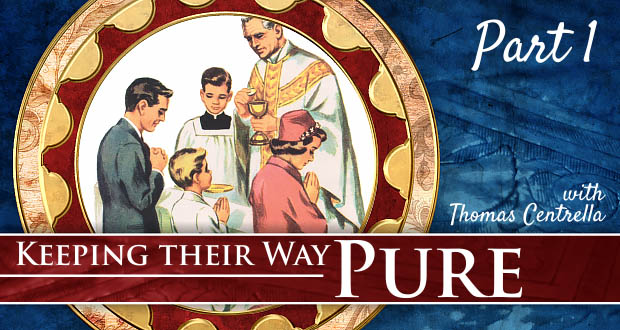by Thomas J. Centrella
How can a young man keep his way pure? By guarding it according to Thy Word. Psalm 119:9
How can we as Catholic parents help our children keep their way pure when they go out into the world? We are living in a culture that is becoming increasingly hostile to all that is good, wholesome, and decent. Although we recognize that the souls of our children are ultimately in the hands of God, we also know that He has placed them in our care. What can we do to protect them so that, when they are on their own, they will not walk away from all we have taught them?
Much could be said, and I don’t claim to have all the answers. However, I do know that certain practices can go a long way in helping our children—as well as ourselves—stay on the right path. In this series, I will focus on seven of these practices:
- Daily Mass and Weekly Eucharistic Adoration
- Frequent Confession
- Immersion in the Mind of Christ, Not the World
- Devotion to Mary through the Daily Rosary
- Charity and Service to Others
- Cultivation of a Personal Relationship with Jesus Christ
- Daily, Reverent Reading of Sacred Scripture
Each of these practices has made a profound difference in my own life, and I firmly believe that if we inspire our children to steadfastly follow these seven practices, God will transform their lives as well. They will become like trees planted near running water whose leaves never fade and whose paths always prosper (Psalm 1:3).
This is not a sprint, however; it is a marathon. Some of these practices are more suitable for older children, and we should try to gradually incorporate them into their lives. Some are suitable for young children as well. Let us ask the Holy Spirit to guide us in determining when and how to introduce these practices.
This week, we will discuss the first two of these important practices.
1. Daily Mass and Weekly Eucharistic Adoration
Jesus said to them, “Truly, truly, I say to you, unless you eat the Flesh of the Son of Man and drink His Blood, you have no life in you; he who eats My Flesh and drinks My Blood has eternal life, and I will raise him up at the last day. For My Flesh is food indeed, and My Blood is drink indeed” (John 6:53-55).
Receiving the King of Heaven in our soul through Holy Communion is a privilege and an amazing miracle. It is truly the best way to attain union with God while living here on Earth. Although it may not always be practical to bring our children to Mass with us every day, they can still benefit from our example. My own mother attended daily Mass at different times in her life, and that example was one of the seeds God used many years later to lead me to the practice.
Provided we are in a state of grace, Holy Communion does for us the very opposite that mortal sin does: “Holy Communion separates us from sin,” for “ the Eucharist cannot unite us to Christ without at the same time cleansing us from past sins and preserving us from future sins” (Catechism of the Catholic Church, no. 1393). Holy Communion is not a substitute for the Sacrament of Penance, which is required for the forgiveness of mortal sins, and receiving the Holy Eucharist while in a state of mortal sin is a grave sacrilege. However, Holy Communion protects us from mortal sin and washes away venial sin.
Along with daily reception of the Holy Eucharist, we should encourage our older children to spend one hour each week in Eucharistic Adoration. “So, could you not watch with me one hour? Watch and pray that you may not enter into temptation; the spirit indeed is willing, but the flesh is weak” (Matthew 26:40-41). When our children spend time with Our Lord in the Blessed Sacrament, they are truly in the best company, and they will not want to ever offend Him or be in company that does. Spending an hour each week in Eucharistic Adoration could also help them learn the importance of silence for their prayer lives. Moreover, it can increase their faith in the Real Presence of Jesus in the Holy Eucharist.
2. Frequent Confession
Blessed is he whose transgression is forgiven, whose sin is covered… When I declared not my sin, my body wasted away through my groaning all day long. For day and night Thy hand was heavy upon me; my strength was dried up as by the heat of summer. I acknowledged my sin to Thee, and I did not hide my iniquity; I said, “I will confess my transgressions to the Lord”; then Thou didst forgive the guilt of my sin (Psalm 32:1-5).
For daily Mass to bear the most fruit in our lives, it should be accompanied by frequent Confession. The grace we receive in Holy Communion is like the sun shining through the windshield of our car. Frequent Confession is the cleaning that our soul, like our windshield, so desperately needs so that the light can shine through in all its glory. Frequent Confession can be very helpful in our walk with Christ. It is an excellent way to cultivate the virtue of humility, and, as a good priest once remarked, “There are no humble souls in Hell.” Moreover, each sacrament confers a unique grace upon the one who receives it, and one of the fruits of the Sacrament of Penance is peace in the soul. I have experienced this peace many times, and I am moved to praise God for His mercy.
How often should we go to Confession? An oft-cited minimum is that every Catholic should go to Confession once a month, but I don’t think doing the minimum is sufficient in today’s corrupt culture. As Sacred Scripture says, “where sin increased, grace abounded all the more” (Romans 5:20). As the world continually falls further away from goodness and truth, the Holy Spirit continually gives us more opportunities to receive grace. However, we need to avail ourselves of these opportunities by frequenting the sacraments.
I personally recommend going to Confession every week. I have tried going every other week, but I have found that weekly Confession is much better for me in my walk with Christ. I typically go on a weekday, rather than on Saturday when the lines are long in my church, and that way my weekly devotion to the sacrament does not hinder someone else from going to Confession who has a grave need to do so. Of course, your own schedule and circumstances will influence when it is best for you to go. Also, I don’t necessarily advise having young children go to Confession every week. However, I do think it is prudent to prepare them by reminding them that we ourselves go to weekly Confession, and that when they get older it would be beneficial for them to do so as well.
Conclusion
The practices we’ve discussed this week can be very beneficial in helping our children stay on the right path. However, if we want them to continue on this path for their entire lives, we need to instill in them another practice that is no less critical to their salvation: Immersion in the Mind of Christ, Not the World. We will discuss this practice in the next article.

 Seton Magazine Catholic Homeschool Articles, Advice & Resources
Seton Magazine Catholic Homeschool Articles, Advice & Resources

